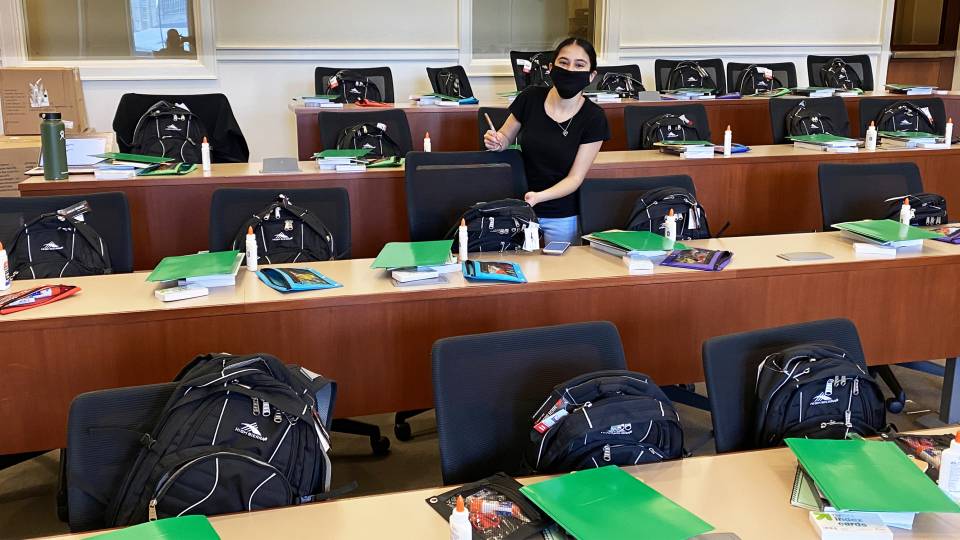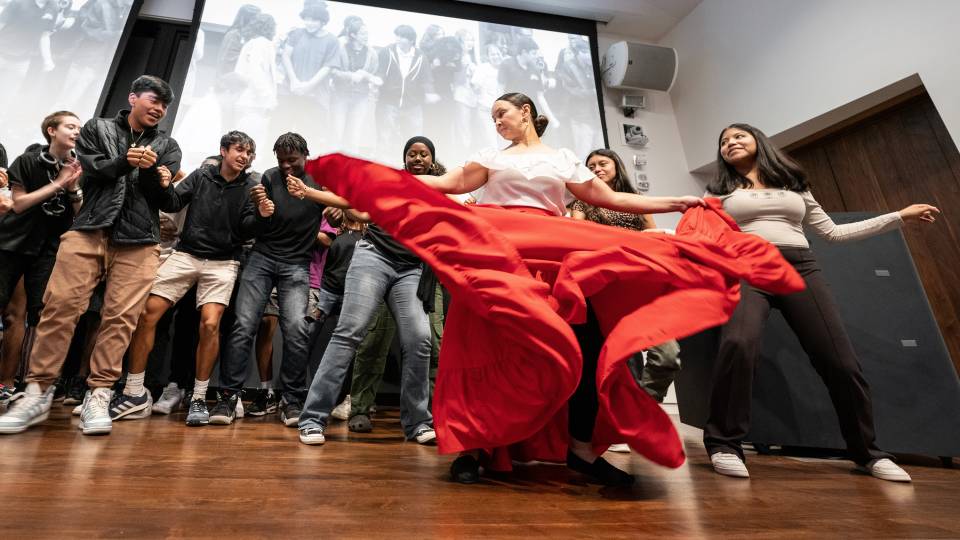Some 100 representatives of colleges and universities, high schools, nonprofits and other organizations convened at Princeton for a major forum addressing the critical need to help disadvantaged youth gain access to and succeed in college.
The Nov. 9-10 forum, "Opening Doors and Paving the Way," was sponsored by the Princeton University Preparatory Program (PUPP) and the Goldman Sachs Foundation. Participants discussed challenges and best practices related to helping low-income and minority students prepare for admission to selective colleges and universities. They also took steps toward establishing a national network of programs and professionals that work to assist disadvantaged but promising students.
"The wide range of programs across the country that are working to increase both college preparation and access for underrepresented minorities suggests there is a lot of expertise that we can learn from," said Jason Klugman, program coordinator for PUPP, an intensive, three-year college preparation program for academically gifted high school students from economically disadvantaged families. Graduates of PUPP, which was founded in 2000, are now attending colleges and universities around the country, including Princeton.
"I've been asked many times about the goals and structure of PUPP by people who either do similar work or who are looking to launch similar efforts at their schools or in their communities," Klugman said. "By convening this forum we have been able to bring together individuals from a range of backgrounds, including well-established community-based programs, new initiatives at public and private universities, admissions, financial aid, student support and high school guidance counseling. Each one brings experience with initiatives that worked or challenges they've faced that can add to what the group knows. Over time, as we develop a professional network, we can build on this collaboration to support our own programming and our students."
Participants in the forum represented more than 70 institutions and programs from around the United States, as well as the United Kingdom, Ireland and South Africa. They discussed themes such as: key components and goals of college-preparation programs; college admissions advising; partnerships between families and schools; and collaboration between educational institutions and philanthropic supporters. They also heard success stories from graduates of PUPP, the Leadership Enterprise for a Diverse America's college preparation program and Prep for Prep, a program that develops the leadership potential of underrepresented students in New York City.
"The event confirmed that this is much more than a Princeton-specific challenge, but one that all selective colleges and universities must face and address," said Princeton faculty member Miguel Centeno, who founded PUPP.
A major goal of the forum was to initiate the publication of a "how-to" manual for educational institutions and other organizations to launch or improve college-preparation programs, as well as a paper "that will lay out a comprehensive argument for investment in these kinds of efforts," according to Klugman. The paper should be completed by the end of the year and the manual should be published by the spring, he said. They will be sent to forum participants and to representatives of colleges and universities around the country, in addition to being posted on the PUPP and Goldman Sachs Foundation websites.
"It's not enough to offer a two-day campus experience, a summer internship or an SAT preparation course. The work of most professionals in this field ranges broadly from home visits and one-on-one, long-term mentoring to extended, residential academic and cultural enrichment summer sessions," Klugman said. "We need to better inform colleges and universities about the experiences of these students in poor rural and urban communities who have extremely limited access to quality educational (and emotional or cultural) services."
Kim Ransom, director of the University of Chicago's Collegiate Scholars Program, said, "It is important for our organizations to become great evaluators of our efforts to prove what really works. The more we are able to come together in forums like this, the more connected we become. This conference broadened my network by leaps and bounds. I learned a great deal and walked away with countless ideas for practices, programming and funding.
"It was inspiring to see so many programs growing across the country and stretching across the globe," Ransom said. "If there is a 'glass ceiling' in terms of accessing selective colleges for underrepresented and low-income students, these universities are taking an active role in demystifying their campuses and providing access for these talented young people."
Stephanie Bell-Rose, founding president of the Goldman Sachs Foundation, said the work performed by participants in the "Opening Doors" forum "is critically important to the future of our country and, in no small way, to the vitality of nations across the globe."
"The need for real leadership -- which is based on inclusion rather than power -- and for effective leaders is hardly confined to this nation or society alone. It is a global question, touching on matters of security and prosperity, as world events remind us continuously," she said. "The need to close the achievement gap affecting low-income, underrepresented students is thus a global issue."
The networking efforts initiated at the forum will be a key factor in helping to address this issue, Bell-Rose added.
"The problem we seek to address is simply too large for any one organization or any one process," she said. "It will take many approaches by a variety of organizations -- universities, nonprofit organizations and funders -- to have a significant impact. To advance achievement of our goals, collaboration can reduce inefficiencies and lost time."






